- Edwin Cruz, 14, is a ninth-grader at Orlando Science School and a member of the robotics team.
Kristopher Pappas, a sixth-grader at Orlando Science School, looks like a lot of 11-year-olds, like he could have a Kindle and a Razor and put a little brother in a headlock. But Kristopher says he wants to be a quantum mechanic, and with a blow dryer and ping pong ball, he proves he’s not an idle dreamer. He turns on the blow dryer and settles the ball atop the little rumble of air stream, where, instead of whooshing away, it shimmies and floats a few inches above the barrel. The trick is cool, but it’s Kristopher’s explanation that fries synapses. “You got to give Bernoulli credit,” he begins.
Bernoulli?
As a whole, Florida students don’t do well in science. The solid gains they’ve made over the past 15 years in reading and math haven’t been matched in biology, chemistry and physics. But schools of choice like the one in Orlando are giving hope to science diehards.
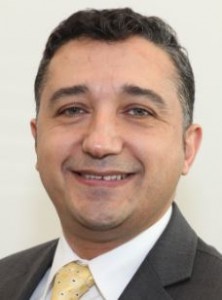
Orlando Science School is a charter school, tucked away in a nothing-fancy commercial park, next to a city bus maintenance shop. Founder and principal Yalcin Akin has a Ph.D in materials engineering and did research at Florida State University’s world-renowned magnet lab. His school opened in 2008 with 109 sixth- and seventh- graders. Now it has 730 kids in K-11 and serious buzz as the science school in Orange County, the 10th biggest school district in the nation. Only 26 schools in Florida can boast that 80 percent of their eighth graders passed the state science test last year (the test is given in fifth and eighth grades). At least two thirds were magnets or charters. Orlando Science School was one of them.
The kids are “constantly challenged, which is what you want,” said parent Kathi Martin. One of Martin’s daughters is in ninth grade; the other is in seventh. Mom wasn’t excited about the neighborhood school; the science magnets were too far away; the private schools didn’t feel like home. During a visit to Orlando Science School, she said, something clicked.
It’s “a school where it’s cool to be a nerd,” she said.
In 2006, the Orange County School Board denied the charter’s application. The state approved it on appeal.
Last year, 1,500 kids were on the waiting list. Last month, Orlando Mayor Buddy Dyer paid a visit.
“This is about word of mouth,” said Tamara Cox, the mother of eighth-grader Akylah Cox. “The parents recognize the value of what’s going on at OSS. That’s why there is such a need and such a calling for it.”
For every bad story about charter schools in Florida, several good ones go untold.
The freedom that has allowed some charters to crash has also allowed many to soar. There is no one single formula for school success, just like there’s no one recipe for top-prize orange blossom pie. But the folks at Orlando Science School and their admirers often point to the same traits. Smaller, more personalized, more disciplined. A nimbleness that comes from being less chained to bureaucracy. A responsiveness that comes from being more tethered to parents.
“If they like us, they come to our school. If they don’t like us, they don’t come,” Akin said. “We have to have a high level of customer service and a high level of performance – or we will not survive.”
***
The pennants line the entrance hall: Harvard, Yale, Princeton, Penn … with a handful of state schools thrown in. The trophy cabinet, meanwhile, overflows with hardware, and not from mere science fairs: the American Mathematics Competition, the EnergyWhiz Olympics, the Future City Competition …
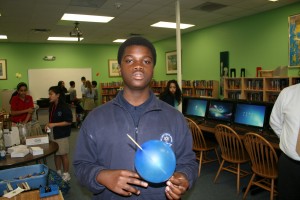
Last year, the robotics team became eligible for the high school world championships – even though its members were all eighth graders. They built a 160-pound ‘bot that scooped basketballs off the floor and heaved them hoop-ward. Last month, the middle grades’ Science Olympiad team took the state title again. For the second year in a row, it will represent Florida at nationals.
“We got two more cabinets coming,” Akin said.
All this would be impressive for even the toniest school in the sun-kissed burbs. But Orlando Science School looks a lot more like Florida. Forty-three percent of its students are eligible for free- or reduced-price lunch (the state rate was 56 percent last year), while 70 percent are minority (the state rate is 58 percent). More specifically, the student body is 31 percent black, 19 percent Hispanic, 14 percent Asian and 6 percent other.
By the time they’re 11 and 12, many of these kids are talking fluently about polymers, surfactants, swerve drives, Oolbleck. They want to be physicists and chemists, computer programmers and environmental engineers. One girl, the daughter of an immigrant who runs a hot dog stand, is set on being a heart surgeon. Nathan Moore, 12, wants to be an astronaut.
“I’m so interested in outer space,” he said. “I want to study other planets.”
The parents who send their kids to Orlando Science School are “not necessarily in the professional classes to begin with,” said Paul Cottle, an FSU physics professor who is familiar with the school. “These are parents who are hoping for upward mobility for their kids through science.”
Last fall, 50 Orlando Science School students trekked to Tallahassee to be inducted into Future Physicists of Florida, a group Cottle started. During a tour of FSU’s nuclear physics lab, an eighth-grader asked: Could you make the superheavy element 120 by fusing two nuclei of element 60?
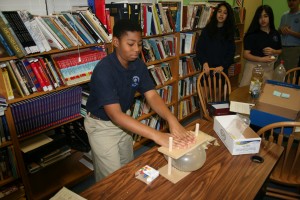
Cottle said he can recall the question word for word, because even most physics undergrads wouldn’t know enough to ask it. At the induction ceremony, he and Charles Weatherford, the physics department chair at historically black Florida A&M University, looked over the crowd and shared the same thought. “We said, ‘We’ve solved the diversity problem in physics, right here,’ “ Cottle said.
Cottle said it doesn’t surprise him that it’s a charter school having this kind of success in science.
“You have this extraordinary small group of people that drive this school. It does happen in traditional schools but man, it just doesn’t happen enough,” he said. “Charters may offer a way for people who otherwise might not be involved in the public school system to be involved.”
***
Akin is reticent to compare his school to traditional public schools. He doesn’t want to give even the appearance that there is an atom’s worth of tension or rivalry. Orlando Science School and the school district have a great relationship, he stressed. “We appreciate their support for us and for charter schools in Orange County,” he said.
The school’s roots go back to what Akin saw during doctoral work at FSU: too many undergrads who weren’t ready for math and science at the college level. He tapped others who had strong science backgrounds before they became teachers – a master’s in chemistry here, a manufacturing engineer there, and so on – then got to work.
The school is heavy on project-based learning. The kids take Algebra I as early as sixth grade. Many take biology in ninth (a year before most high school students). More than 150 students attend a voluntary Saturday school. Science is infused into everything.
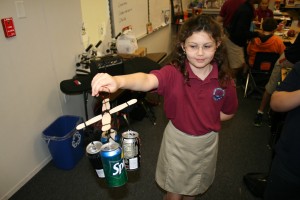
In Amy Trujillo’s third-grade class, students researched their favorite scientist – then did a writing assignment comparing themselves to him or her. This week, they’ll Skype with scientists at NASA. To prepare, they read up on astronomy and did “sun spot poetry.”
Trujillo taught for five years in other public schools in Kansas and Florida before joining Orlando Science School this year. The difference? “You can breathe.”
“We have more choice in the curriculum. We have science textbooks, we have reading textbooks, but there’s choice,” she said. “At my old school, you teach from this book, this page. If (administrators) walk into your room, you should be on the same page, the same lesson, as all the other teachers.”
Trujillo said she makes home visits to build rapport with parents – something her previous schools frowned on. When some parents invited her entire family over for dinner, she ran it past Akin. If you’re fine with it, he told her, we’re fine with it.
***
Kristopher, the 11-year-old future physicist, is a patient teacher. Bernoulli, he explains, is the guy who came up with the theory that describes why the ping pong ball doesn’t get blasted away by the blow dryer. (Cottle, the current physicist, says Bernoulli’s principle also explains why airplanes fly.) Kristopher offers more detail, then shifts to other interests. Like worm holes.
“I want to study and reach alternate dimensions,” he says as the dryer drones and the ball bobs.
He’s off to a good start.


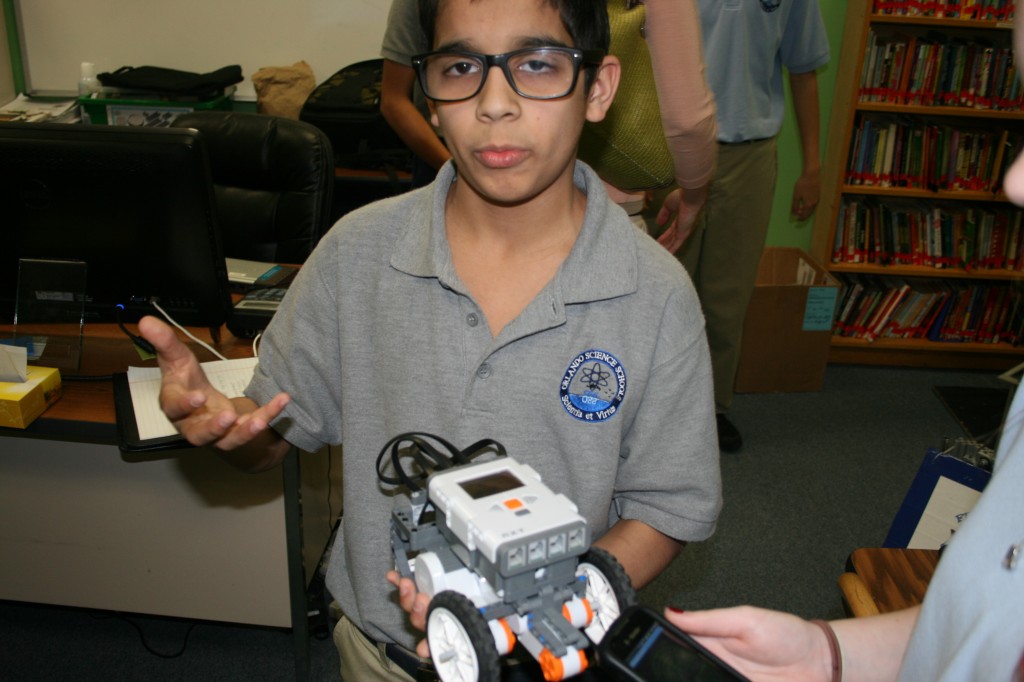

[…] School, another charter and perhaps the most audacious science education project in the state (see this feature from redefinedonline.org) also averaged 12 on the physical science section. Their pass rate for […]
[…] But our society still needs scientific and technological leaders. If the public K-12 schools don’t want the job of preparing our best and brightest for these roles, then who will do it? (Yikes! That sounds like a school choice argument! Is that where we’re heading?) […]